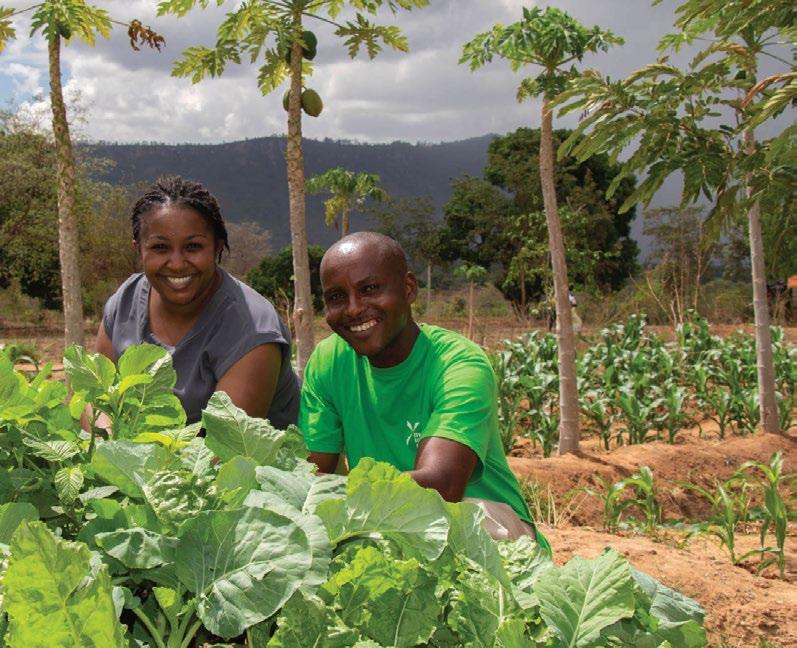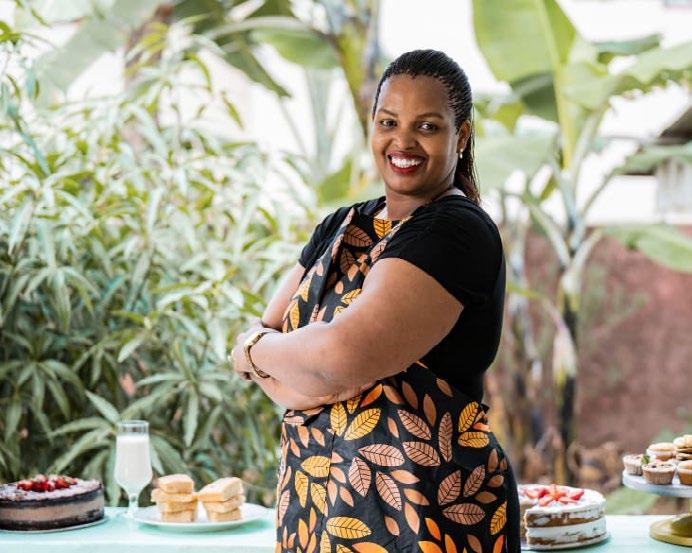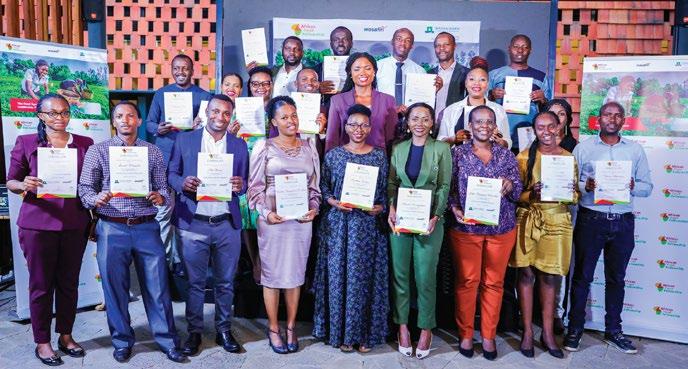
4 minute read
Connects new generation of leaders for food system change
How to change food systems in Africa so that everyone has fair access to healthy and sustainable food? The African Food Fellowship brings together a new generation of African professionals to turn passionate effort into system change. We look back on the first two years of the Fellowship in Kenya and Rwanda.
“There are plenty of good intentions, strategies and agendas to achieve food systems change in Africa,” says Joost Guijt, Director of the African Food Fellowship and Knowledge Manager at Wageningen Centre for Development Innovation, part of Wageningen University & Research “The problem is implementation. We need a new generation of leaders in the African agri-food sector to translate plans into real systemic changes and to stand firm for these changes.”
Advertisement
That new generation is now coming together in the African Food Fellowship. In 2021, two groups of thirty professionals each in Kenya and Rwanda became Fellows, starting their leadership journey with the 10-month Food Systems Leadership Programme before graduating into respective country food fellowships.
The Fellowship recruited two new groups of forty in 2022. The aim of the initiative is to help participants work on shifts in policy, influence, investment and implementation together. Guijt: “We paid a lot of attention to the content of food system transformation and how leaders can act on it. We then work with Fellows to make this relevant for their daily jobs.”
Close community
Two years after its launch, a lot has been achieved, according to Guijt: “First of all, we see that the Fellows present themselves much more emphatically as leaders of food system transition. They look fundamentally differently at the meaning of their work. Many have moved from working on isolated problems in the food system, to now focus more on the drivers for system change. Equally important, a strong reciprocity has developed between Fellows in both countries. They often felt alone and insecure in their roles and knew little or nothing of each other’s existence. Because they found each other through the Fellowship, they draw courage and ideas from each other. We are seeing many cross-pollinations between actors that were not there before.”
Dealing better with stakeholders
Ruth Lewo Mwababu, a business developer in the Kenyan aquaculture sector, is an Aquaculture Fellow of the African Food Fellowship. She says that she benefits greatly from the programme in her work: “First of all, the Fellowship taught me new skills and capacities for dealing with complex issues. If you want to bring aquaculture to local communities, you have to deal with many parties: from farmers, the local administration and policy makers to input suppliers. The Fellowship programme enables me to better deal with these stakeholders, both individually and as a group. I zoom out, zoom in and bring parties back to the table.”
Ruth particularly encourages mediumlevel technical food system professionals to apply for the African Food Fellowship. These, she says, have the necessary sector experience and recognise the challenges at hand: “If you want to grow and expand your capabilities, this Fellowship is for you. Especially if you have an open mind and the ambition to become a critical thinker. It helps if you
“The fellowship has taught me new skills for tackling complex issues.”
“There is lots involved in creating a proposal at this level of ambition and scope. Without all the dedication and cooperation, we wouldn’t have been able to make it work.” have already worked with different agricultural sub-sectors.”
Historic donation makes expansion possible
After a one-and-a-half-year pilot, a follow-up was again supported by the IKEA Foundation in 2022 with a donation of € 8.8 million – a historically high gift to University Fund Wageningen. The plan is to start a new group every year in both countries for at least the next five years. This means the Fellowship will be expanded annually with a new layer. In addition, preparations are underway to scale up to another seven countries on the African continent. The focus is on supporting enthusiastic Fellows in the more effective initiation and development of system-changing actions. By 2027 nearly 1000 Fellows will have taken the Food Systems Leadership programme to continue in a continental network of national Food Fellowships.
University Fund Wageningen supported and facilitated Joost Guijt in developing the proposal, setting up the donation agreements, and in other legal and tax matters. During the project, the fund also provided support with reporting and accountability to the IKEA Foundation. “There is lots involved in creating a proposal at this level of ambition and scope,” says Joost. “Not just intrinsically, but also with regards to budget, administration and legal aspects. We succeeded thanks to the huge efforts of all the stakeholders and professional teams

Six modules, Ten months - More than a one-off programme
at WCDI and UFW. Without their dedication and cooperation, we wouldn’t have been able to make it work.”
Philanthropic fundraising
One of our main goals for the coming years is to be the WUR’s central organisation in the field of strategic relation management with philanthropic partners as well as the expert in the field of philanthropic fundraising. Our approach centres on establishing a personal relationship with our business relations: friendraising before fundraising. Via careful and long-term relationships we aim to establish partnerships which have an impact and help realise pioneering research within WUR. We also provide support to scientists in developing and submitting proposals for large-scale international (philanthropic) organisations. in doing so, we contribute to the transitions necessary for a sustainable world.
The African Food Fellowship, a joint initiative of Wageningen University & Research and Wasafiri Consulting and supported by the IKEA Foundation and University Fund Wageningen, starts with a 10-month intensive leadership programme. In six modules, Fellows gain insight into food systems in their broad context and learn how to ensure systemic change. Besides some physical networking meetings, most of the programme is online. “Corona initially made this a necessity,” Guijt explains. “Gradually we discovered that this allowed us to reach people all over Kenya and Rwanda with the programme and not just from one or two cities.”
The leadership programme is the gateway to a long-term Fellowship. These country food fellowships are supported networks where Fellows can continue to connect and collaborate as they continue their leadership journeys. An annual Transform Food Festival, food systems action prizes, inspiration sessions and more are part of what the African Food Fellowship is experimenting with to elevate the efforts of its Fellows. Solid research carried out by the Fellowship is seeking evidence on how passionate, competent, accountable leadership can really transform food systems, so they provide personal and planetary health and healthy prospects for many.








